Anti-Semitism

Anti-Semitic incidents have been rising in the U.S. in the past few years, and many Jews and others fault the Trump administration for only belatedly calling out anti-Semitism, and for failing to explicitly denounce those who have heralded his election as a victory for white people.
And Jewish and Muslim groups have banded together in unprecedented ways, in recent months, as mosques and Jewish institutions have been targeted.
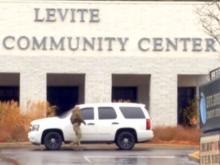
Enrollment has dropped at more than a quarter of Jewish Community Center preschools since a wave of threats against JCCs began in early January.
“I’m starting with the most difficult news, which is simply that more JCCs indicated something of a decline — but the majority have not,” said David Posner of the Jewish Community Center Association of North America, sharing the results of the umbrella group’s latest member survey.

Following a report that President Trump is thinking of scrapping the ambassador position assigned to combat global anti-Semitism, a bipartisan group of 167 U.S. House members sent a letter asking him to appoint one soon.
The letter, released on March 13, asks Trump to “maintain and prioritize” the appointment, in a time of rising anti-Semitism.

President Trump, long-chided for failing to address a surge in hate crimes, began his first address to Congress by invoking Black History Month, and condemning recent threats against Jewish institutions and the shooting of Indian men in Kansas City.

The Rev. Leah Daughtry stood in front of fellow black Christian leaders and told them they will need to work harder for social justice.
“If you’ve been feeding them, now clothe them,” said the Pentecostal pastor and 2016 CEO of the Democratic National Convention Committee at a conference last week. “If you’ve been clothing them, now console them. If you’ve been at a march, now lead the march. If you’ve been at a rally, now organize the rally.”
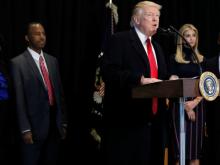
The condemnation came too little, too late, Jewish groups said.
On Feb. 21, President Trump condemned anti-Semitism, as Jewish leaders had been asking him to do for months.
“The President’s sudden acknowledgement is a Band-Aid on the cancer of Anti-Semitism that has infected his own Administration,” said Steven Goldstein, executive director of the Anne Frank Center for Mutual Respect, in a statement on Feb. 21 after Trump called anti-Semitism “horrible.”
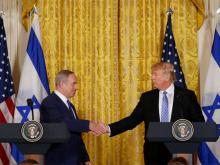
The reporter asked President Trump about the rise of anti-Semitism in America. His answer — or seeming lack of one — angered many prominent Jewish Americans.
“Donald Trump’s inability to simply condemn antisemitism boggles the mind,” said Stosh Cotler, CEO of Bend the Arc Jewish Action.

At least 16 Jewish community centers received bomb threats on Jan. 9, in an apparent attempt to rattle American Jews, who have seen a spike in anti-Semitism incidents in the past year.
The threats — some by live callers, some by robocall — were made to JCCs in Florida, Maryland, New Jersey, Tennessee, South Carolina, and at least four other states.

“This magnificent grace, this expansive grace, this ‘Amazing Grace’ calls me to reflect. And it calls me to pray. It calls me to ask God for forgiveness, for the times that I’ve not shown grace to others, those times that I’ve fallen short.”

All was apparently going fine until Micha Brumlik, a retired Frankfurt University education professor and respected Jewish commentator, wrote last June that the popular toy was “anti-Jewish, if not even anti-Semitic.”
The problem, he said, was the inscription on the open pages of the Bible that the Playmobil Luther holds. On the left is written in German: “Books of the Old Testament. END,” while the right page says “The New Testament, translated by Doctor Martin Luther.”
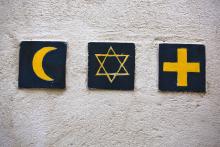
Imagine receiving this message on your voicemail: “Dear Mr. Gonzalez, we regret to inform you that your heart surgery has been canceled. The medical professionals scheduled to perform it, Doctors Sarna and Latif, have discovered that they have serious disagreements about Middle East politics. Consequently, they are refusing to work together. We will do our best to find you other doctors, before your condition becomes fatal.”
Seem far-fetched? In my mind, it is the logical outcome of the manner in which many Jewish and Muslim groups have chosen to engage each other in recent years. Or, rather, not engage.
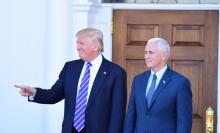
President-elect Donald Trump will spend much of the time until his inauguration on Jan. 20 composing his new administration. That means naming Cabinet appointees, and government department or agency heads, as well as selecting advisers.
Many of Trump’s appointments so far are people of faith; some are supported or opposed by different faith groups; others have made public statements, or taken actions, regarding different faith groups.
Here is a list of Trump’s picks to date and a description of their relationship to religion.
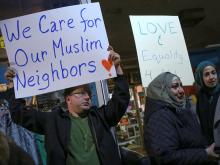
The American Civil Liberties Union collected more than $11 million and 150,000 new members. The Southern Poverty Law Center’s Twitter account gained 9,000 followers. And the Anti-Defamation League, which fights anti-Semitism and other bigotries, saw donations increase fiftyfold.
In the days since Donald Trump won the presidency, these spikes, in support for groups that defend religious and other minorities, speak to a fear that the president-elect will trample on their rights — or at least empower those who would.
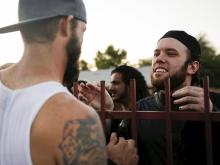
Though Jews remain the most frequent victims in America of hate crimes based on religion, the number of incidents against Muslims surged in 2015, according to newly released data from the FBI.
Hate crimes against Muslims spiked 67 percent from 2014 to 2015. That represents 257 anti-Muslim incidents.
Robert McCaw, government affairs director at the Council on American-Islamic Relations, said the jump in anti-Muslim incidents continues to rise and even accelerated after the Nov. 8 election.
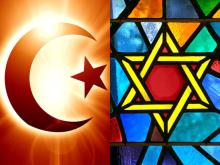
The day after President-elect Donald Trump appointed a man accused of anti-Semitism and Islamophobia as his chief strategist, two of the nation’s largest Jewish and Muslim advocacy groups formed an unprecedented partnership to fight bigotry.
The American Jewish Committee and the Islamic Society of North America, on Nov. 14, launched the new national group: The Muslim-Jewish Advisory Council. Though Jewish and Muslim groups have cooperated before, the size and influence of these two particular groups — and the prominence of the people who have joined the council — marks a milestone in Jewish-Muslim relations.

When architects planned the Waldorf Astoria Hotel Jerusalem, they designed it with the Jewish holiday of Sukkot, or Feast of Tabernacles, in mind.
The hotel has an atrium with a retractable roof, as well as large, unobstructed patios to accommodate sukkahs, temporary structures Jews are commanded to dwell in during the holiday. In Israel the holiday, which began on Oct. 16, is observed for seven days, everywhere else for eight.

Siavosh Derakhti, a young Swedish Muslim honored in Europe and the U.S. for his campaign to counter anti-Semitism, always explains his motivation by invoking David.

Pope Francis on July 29 paid a silent visit to the Auschwitz concentration camp where he spent intense moments in prayer, embraced Holocaust survivors, and met those who risked their lives to help Jews persecuted by the Nazis.
But while Francis made no speeches during his time at the notorious camp, where more than 1 million people, mostly Jews, died during World War II, he left a simple written plea in the guest book: “Lord, have mercy on your people! Lord, forgiveness for so much cruelty!”
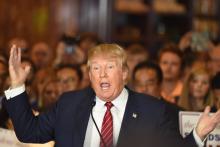
Donald Trump can’t let it go.
The presumptive Republican presidential nominee has faced days of pointed criticism for a Twitter attack on Hillary Clinton that used an image that looked like the Star of David and appeared to deploy anti-Semitic stereotypes.
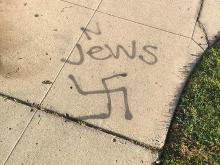
Violent anti-Semitic attacks in the U.S. rose 50 percent last year. According to the Anti-Defamation League, there were a total of 56 against Jewish victims.
“And we know that for every incident reported, there’s likely another that goes unreported,” said Jonathan A. Greenblatt, CEO of the ADL, which produced the study and calls the trend “very concerning.”